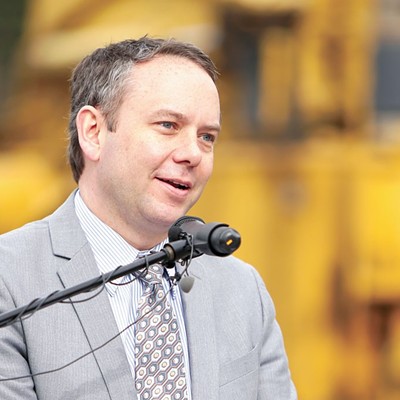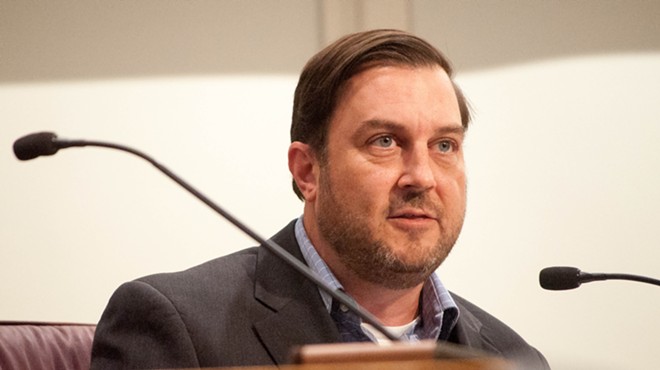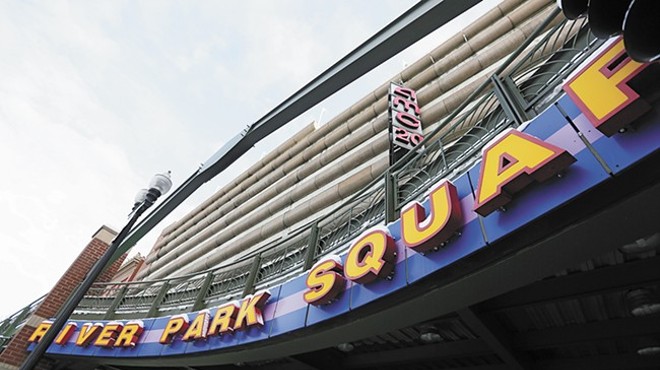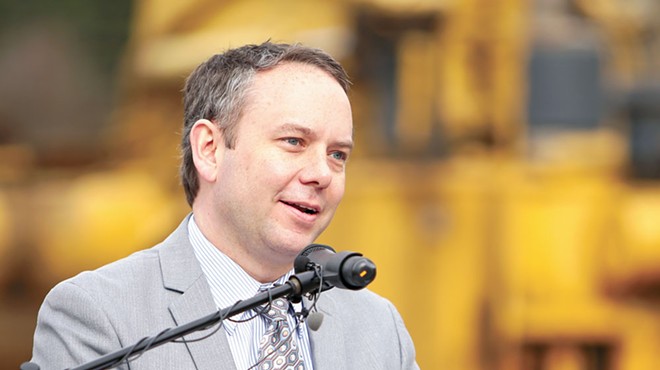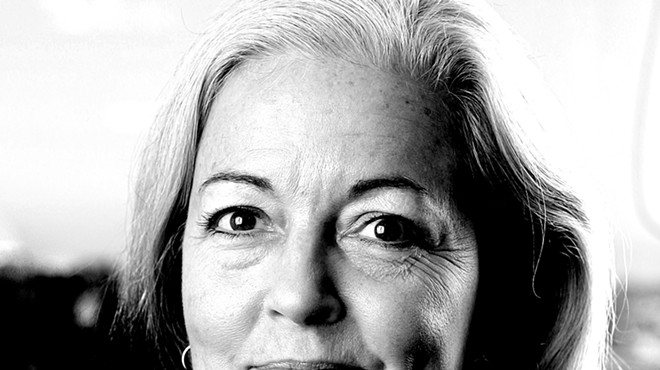Tuesday, November 3, 2015
How the "One-Term Mayor Curse" took out the previous 10 Spokane mayors

Tonight, we find out if David Condon is to Spokane mayors what Curt Schilling was to the 2004 Red Sox. We find out if Condon has what it takes to defeat Spokane’s famous one-term mayor curse.
Spokane has not re-elected a mayor since David Rodgers in 1973. In the years since, some mayors, facing health and financial problems, opted not run for re-election. Others, facing controversies over garbage disposal, police oversight, a gay-sex scandal and one particularly pesky parking garage.
1. Ron Bair (1978-82)
Did not run for re-election
Key Factor: Personal finances
Ron Bair, Spokane’s mayor during the Mount St. Helens eruption, also opted not to run for re-election for mayor, but for a different reason: Back then, being mayor was a part-time job. A city manager held most of the administrative power, and the mayor wasn’t much more than a glorified city councilman. Back in Bair’s era, the job paid only $9,000 the equivalent of a little less than $33,000 today.
"I couldn't afford it," he said. "I had to get out to make a living." His business, Ron Bair Tours, was struggling as the travel-agency industry began to shift with airline deregulation. Even before he became mayor, it was revealed that he owed Spokane taxes and city fees. He said his mayoral job was putting a strain between himself and his wife. (He and his wife had a trial separation during his term.) Still, his decision not to run for reelection surprised local observers. Bair, a former KXLY newscaster, had been playing coy with his decision of whether to run for reelection, even after Jim Chase announced his campaign.
Getting out of politics didn’t cure his money woes. A year after leaving the mayoral position, his home was foreclosed upon. Debt collectors continued to circle. "At the heart of the matter is a lien by the Internal Revenue Service in excess of $36,000,” his attorney explained in one debt case.
2. Jim Chase (1982-86)
Did not run for re-election
Key factor: Health problems
Jim Chase, Spokane’s first black mayor, was popular, with his tenure not defined by the sort of rancor that has faced most mayors ever since.
“He probably could have been re-elected, but health problems prevented him from seeking a second term,” Jim Kershner wrote in the Spokesman-Review in 2008.
After missing more than a month of council meetings due to a back surgery, Chase, at 70, announced he wasn’t going to seek re-election. He died of cancer three years later.
3. Vicki McNeill (1986-90)
Did not run for re-election
Key factors: Trash incinerator, abrasive interactions
Spokane’s first female mayor gave an age-old explanation for opting not to run for reelection: She wanted to spend more time with her family. But there’s no question that she faced serious political hurdles to getting re-elected. The headliner items in her legacy — the trash incinerator, the building that would later become the convention center, the push to build the Spokane Arena — were also some of her most controversial decisions. Sheri Barnard — the ultimate winner of the election — won beating the drum against the incinerator project.
But McNeill’s leadership style also can’t be discounted. She got the nickname “Queen Vicki” for what critics saw as her imperious tendencies. She herself copped to being a “little bit of a bulldozer.” And at one council meeting dragging until 2
4. Sheri Barnard (1990-94)
Finished last in a five-candidate primary with only 12 percent of the vote
Key factor: Couldn’t fight city hall
She was the first mayor to decide to run for re-election in 20 years, but Sheri Barnard’s attempt was a disaster. The Spokesman-Review 's Mike Prager called her primary loss a “stunning defeat.”
The populist Barnard had originally run on the unofficial bumper sticker of “You can fight City Hall,” Spokesman reporter Jim Camden noted, but as an incumbent Barnard couldn’t fight the establishment. Instead, she seemed inert. She appointed so many task forces she couldn’t even remember them all, but getting things done was another matter. The weak mayor system of government didn’t allow Barnard much room to get much done, and business groups hated her. And despite her early fight against the incinerator, she couldn’t stop it. The same election that elevated her also elevated supporters of the incinerator project on the council.
“If this was a strong mayor system of government, I could have stopped the incinerator,” she said. “We’re the laughing stock of the state for having that incinerator.”
The people were angry, filing petitions to pay for more police and to roll back the salaries and zoning changes — all ideas that Barnard had opposed. But while her opponents opposed a tax for more police because it was a tax, Barnard opposed it because she said the city didn’t need more police. This, near the peak of the national violent crime wave .
5. Jack Geraghty (1994-98)
Defeated by John Talbott, by only 433 votes
Key factor: River Park Square, the Lincoln Street Bridge
Jack Geraghty was the first mayor to grapple with the River Park Square redevelopment. The square’s parking garage — a public-private partnership that consultants wildly overestimated the amount of revenue it would bring in – would become the biggest issue in Spokane politics for the next half-dozen years.
You know the sort of person that gets up at city council meetings and angrily denounces things? That was John Talbott, Geraghty’s opponent. But back in November of 1997, the electorate was in a mood for angry denunciation. Talbott called for an independent auditor to investigate the city, attacked the River Park Square and Lincoln Street Bridge projects. Geraghty’s ”style of leadership is short on vocal confrontation,” the Inlander complained in its endorsement of Talbott.
6. John Talbott (1998-2000)
Defeated decisively by John Powers, 55.2 to 44.7 percent
Key factor: River Park Square, personal abrasiveness
"This city is yearning for healthier relationships,” Powers said on the night of the primary. “Ours have not been healthy.”
7. John Powers (2000-03)
Defeated in the primary, drawing only 20 percent of the vote
Key factors: River Park Square, inexperience
In 2003, Sheri Barnard struck back. She turned the primary into a five-man race, drawing votes away from John
And while John Powers came in hoping he could solve the mess surrounding River Park Square, it proved more complicated than he’d hoped.
“Back in 2000, candidate John Powers struck a chord with a frustrated electorate: He could untangle the River Park Square mess, he said on the campaign trail, through mediation. It seemed so obvious; why hadn't anybody thought of it before?” Ted McGregor, Jr. wrote in the Inlander. “
8. Jim West (2003–05)
Recalled with 65 percent of the vote
Key factor: That whole gay sex scandal thing
Forget a second term. Jim West didn’t even finish his first. It was an open secret in the political community that the conservative Republican Jim West was secretly gay — even as he threatened to veto a bill to extend benefits to domestic partners in the city. But others suspected him of seedier things, offering favors in exchange for sex favors to young men. A three-year Spokesman-Review investigation into West came to the point where the newspaper decided to hire a computer expert by the pseudonym “Moto-Brock” to pose as a young gay man to prove West was using Gay.com to make dates. Other accusations, including whether West molested kids in the 70s and the 80s, were never proven. But he did admit he’d used his computer to visit Gay.com.
"If the newspaper can do this to me, they can do it to anybody,” West fumed. “They can run anybody off."
Spokane became the butt of national jokes (comedian Al Franken called West the “anti-gay, gay mayor) but West refused to quit. So a supermajority of voters, in December of 2005, forced his hand.
9. Dennis P. Hession (2005–07)
Defeated by Mary Verner, 47.8 percent to 52.2 percent
Key factor: Garbage pickup, inclusiveness
Sometimes, it’s the little things that can make a difference. In October of 2007, Dennis Hession, chosen to replace Jim West, defended a city decision to choose not to pick up garbage in certain narrow city alleys that had outraged North Spokane neighbors. In one debate, Hession, an attorney, gave a wonky numbers-based analysis citing “hazards and liabilities.” But his opponent Mary Verner eschewed the stats for talking in general terms about compassion and listening.
“If something doesn’t change here pretty soon I’m going to out here hauling cans to the street for some of our neighbors and friends,” his opponent Verner argued. “Right now we’re hearing loud and clear, ‘[the garbage pickup decision] was a dumb idea’.”
It wasn’t the only issue, of course. But it played perfectly a larger narrative about tone. Hession: Cold and out-of-touch. Verner: Listener and consensus-builder.
“Listening is an important skill for a mayor, and if Hession loses this election, it could be traced to not spending enough time connecting with the street-level concerns out in the neighborhoods,” the Inlander mused before the election.
10. Mary Verner (2007–11)
Defeated by David Condon, 47.6 percent to 52.9 percent
Key factors: Police oversight, utility rates, big money
Mary Verner looked like she was set. She came out the primary with over 60 percent of the vote. But three things turned it the other way. First, Condon lambasted double-digit utility rate increases, promising to reverse the trend. Next, in September, Verner gave a widely savaged press conference about the city’s controversial handling of the Otto Zehm case, a mentally disabled janitor who had died in 2006 after being beaten by Police Officer Karl Thompson. She left without answering questions. While Verner lamented the lack of available options for dealing with the lawsuit from Zehm’s family and improving police oversight, Condon pounced.
“Prosecutors, police officers, and city attorneys all contributed to this terrible situation,” Condon told the Inlander. “Ultimately, Mayor Verner is to blame for failing to put on the
Verner called Condon
And at the last minute, at the end of October, Condon got a $25,000 donation from the state Republican party. Critics saw it as a way to skirt public financing laws. In November, he got yet another big check from the state GOP.
Money’s one reason why Condon won four years ago. If he wins tonight, money may once again play a role.
Tags: News; Mayor; Mary Verner; Jim West , David Condon; John Talbott; John Powers; Jack Geraghty; Sheri Barnard; Vicki McNeill; Ron Bair , News , election 2015 , Image




